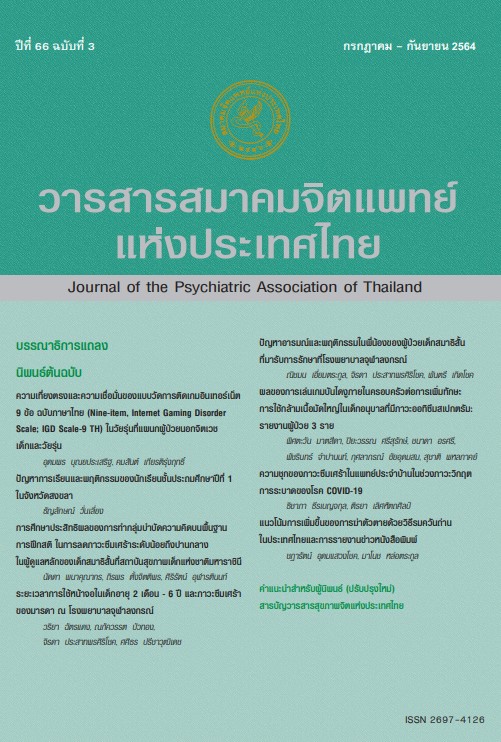The Effectiveness of Group Mindfulness-Based Cognitive Therapy (MBCT) for Reducing Mild to Moderate Depressive Symptoms in Primary Caregivers of Children with Attention Deficit Hyperactivity Disorder (ADHD) at Queen Sirikit National Institute of Child Health
Main Article Content
Abstract
ABSTRACT
Objective: To compare the effectiveness of Group Mindfulness-Based Cognitive Therapy (MBCT), psychoeducation and usual care for reducing mild to moderate depressive symptoms in primary caregivers of children with ADHD.
Methods: Main caretakers of children diagnosed with ADHD who visited psychiatric outpatient department, Queen Sirikit National Institute of Child Health between 1 November 2019 to 31 October 2020 were enrolled if their Hamilton Rating Scale for Depression (HRSD) scores were lower than the cut-off point indicating severe depression (HRSD≤17). They were purposive sampled to group-based MBCT (3-hour, one session) or group psychoeducation (1 hour) or as usual care. HRSD were used for assessing the degree of depressive symptoms whereas the severity of ADHD symptoms in their child were measured by Swanson, Nolan and Pelham Questionnaire (SNAP-IV) before and at one month after the group session.
Results: Participants were randomized sampling into a MBCT groups (n=20), Psychoeducation groups (n=20) and Treatment as usual care (n=21). The mean score of HRSD in MBCT group were declined significantly from 8.20 ± 4.69 to 5.60 ± 4.88 (p=0.004, d=0.74) at one month after the intervention, as well as the mean HRSD score of participants in as usual care (p=0.038, d=0.49). There was no significant change in HRSD score of participants in psychoeducation group. Likewise, there was no significant change in SNAP-IV score of ADHD symptoms reported by participants in all three groups.
Conclusion: One session of Mindfulness-Based Cognitive Therapy is an effective targeted intervention to reduce depressive symptoms in caretakers of children with ADHD.
Article Details
Articles submitted for consideration must not have been previously published or accepted for publication in any other journal, and must not be under review by any other journal.
References
Visanuyothin T, Pavasuthipaisit C, Wachiradilok P, Arunruang P, Buranasuksakul T. The prevalence of attention deficit/hyperactivity disorder in Thailand. J Ment Health Thai 2013; 21: 66-75.
Pliszka SR. Pattern of psychiatric comorbidity with attention-deficit/hyperactivity disorder. Child Adolesc Psychiatr Clin N Am 2000; 9: 525-540.
Lesensne CA, Visser SN, White CP. Attention-deficit/hyperactivity disorder in school-aged children: Association with maternal mental health and use of health care resouces. Pediatrics 2003; 111: 1232-1237.
Chronis AM, Lahey BB, Pelham WE, Kipp HL, Baumann BL, Lee SS. Psychopathology and substance abuse in parents of young children with attention-deficit/hyperactivity disorder. J Am Acad Child Adolesc Psychiatry 2003; 42: 1424-1432.
Munoz RF, Beardslee WR, Leykin Y. Major depression can be prevented. Am Psychol 2012; 67: 285.
Corio MJ, Riley A, Broitman M, Miranda J. Effects on children of treating their mother's depression: results of a 12-month follow-up. Psychiatr Serv 2012; 3: 357-363.
Thase ME, Entsuah AR, Rudolph RL. Remission rates during treatment with venlafaxine or selective seretonin reuptake inhibitors. Br J Psychiatry 2001; 173: 234-241.
de Mello MF, de Jesus Mari J, Bacaltchuk J, Verdeli H, Neugebauer R. A systematic review of research findings on the efficacy of interpersonal therapy for depressive disorders. Eur Arch Psychiatry Clin Neurosci 2005; 255: 75-82.
DeRubeis RJ, Hollon SD, Amsterdam JD, Shelton RC, Young PR, Salomon RM, et al. Cognitive therapy vs medications in the treatment of moderate to severe depression. Arch Gen Psychiatry 2005; 62: 409-416.
Hayes SC, Hofmann SG. The third wave of cognitive behavioral therapy and the rise of process-based care. World Psychiatry 2017; 16: 245-246.
Hofmann SG, GÓmez AF. Mindfulness-Based Interventions of Anxiety and Depression. Psychiatr Clin North Am 2017; 40: 739-749.
Hansudewechakul K, Tangjittiporn T, Ularntinon S. The effectiveness of mindfulness-based cognitive therapy to reduce depressive symptoms in primary caregivers of children with attention deficit hyperactivity disorder at child and adolescent psychiatric outpatient department Queen Sirikit National Institute of Child Health. j dept med ser 2019; 44: 108-113
Oliveira CT, Dias AC. Psychoeducation for Attention Deficit/Hyperactivity Disorder: What, How and Who Shall We Inform? Trends in Psychol 2018; 26: 263-281.
Lotrakul M, Sukanich P, Sukying C. The Reliability and Validity of Thai version of Hamilton Rating Scale for Depression. J Psychiatr Assoc Thailand 1996; 41: 235-246.
Pityaratstian N, Booranasuksakul T, Juengsiragulwit D, Benyakorn S. ADHD screening properties of the Thai version of Swanson, Nolan, and Pelham IV Scale (SNAP-IV) and Strengths and Difficulties Questionnaire (SDQ). J Psychiatr Assoc Thailand 2014; 59: 97-110.
Lemeshow S, Hosmer DW, Klar J, Lwanga SK. Adequacy of Sample Size in Health Studies. Chichester: John Wiley & Sons; 1990.
Morokuma I, Shimodera S, Fujita H, Hashizume H, Kamimura N, Kawamura A, et al. Psychoeducation for major depressive disorders: a randomized controlled trial. Psychiatry Res 2013; 210: 134-139.
Chiesa A, Castagner V, Andrisano C, Serretti A, Mandelli L, Porcelli S, et al. Mindfulness-based cognitive therapy vs. psycho-education for patients with major depression who did not achieve remission following antidepressant treatment. Psychiatry Res 2015; 226: 474-483.
van der Velden AM, Kuyken W, Wattar U, Crane C, Pallesen KJ, Dahlgaard J, et al. A systematic review of mechanisms of change in mindfulness-based cognitive therapy in the treatment of recurrent major depressive disorder. Clin Psychol Rev 2015; 37: 26-39.
Wong SYS, Yip BHK, Mak WWS, Mercer S, Cheung EYL, Ling CYM, et al. Mindfulness-based cognitive therapy v. group psychoeducation for people with generalised anxiety disorder: randomised controlled trial. Br J Psychiatry 2016; 209: 68-75.
Morokuma I, Shimodera S, Fujita H, Hashizume H, Kamimura N, Kawamura A, et al. Psychoeducation for major depressive disorders: a randomized controlled trial. Psychiatry Res 2013; 210: 134-139.
Tuithof M, Ten Have M, van Dorsselaer S, Kleinjan M, Beekman A, de Graaf R. Course of subthreshold depression into a depressive disorder and its risk factors. J Affect Disord 2018; 241: 206-215.
Silpakit O. The invention of the mindfulness assessment scale. J Ment Health Thai 2015; 23: 72-90.


